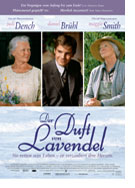

Opening 6 Oct 2005
Directed by:
Charles Dance
Writing credits:
William J. Locke, Charles Dance
Principal actors:
Judi Dench, Maggie Smith, Natascha McElhone, Daniel Brühl, Miriam Margolyes
Two elderly sisters, Ursula (Maggie Smith) and Janet (Judi Dench) live alone in a beautiful wind-swept stone house on the English coast. Their lives revolve around cosy evenings listening to the radio, drinking tea and changing from proper old English ladies’ pastel dresses to white nightgowns and back. They are in their nightgown phase when they find a young man named Andrea (Daniel Brühl) washed up on their shore. Excitement enters their lives in spite of a language barrier (he speaks only Polish and German). They nurse him back to health under the sage guidance of Dr. Mead. Slowly, slowly a delicate tension builds up as old Janet falls in love with Andrea; he turns out to be a virtuoso on the violin; a Russian woman named Olga (Natascha McElhone) attempts to befriend him; and Dr. Mead is jealous.
In this first film by director Charles Dance all as smooth as English jelly and sometimes very kitschig, as in one pastoral scene when the farmers are bringing in the harvest. Never do the sisters go at each other tooth and nail or report Andrea to immigration. We’ll never know why Andrea fell into the sea or wants to go to America. The only rough edges come from the housekeeper Dorcas (Miriam Margolyes) and the distant threat of a war in this year of 1936. Perhaps the sense of “nothing happening” comes from the fact that the screenplay is based on a short story by William J. Locke, and a short story offers too little to fill 103 minutes on screen. Also, Locke lived 1863-1930, which we might perceive as the good old days of slower and simpler. After accepting that fact, what is there to enjoy? The scenery is breath-taking; Joshua Bell plays the violin beautifully; this is a rare chance to compare directly Smith and Dench, those formidable dowagers of British film; and Brühl is the right person for the role.
As an aside: Locke probably didn’t know that he was pre-dating Sesame Street when he added two old geezers who sit on a bench and comment on village life. And the film is much more modern than meets the eye. Just this summer an unidentified young man washed up on the shores of Britain. He never spoke but played the piano. Many months later his family was located in German Bavaria. Perhaps if this Piano Man had recuperated at the home of the Waddington sisters, instead of in a state hospital, he, too, would have celebrated a triumph with the London Philharmonic. (Becky Tan)